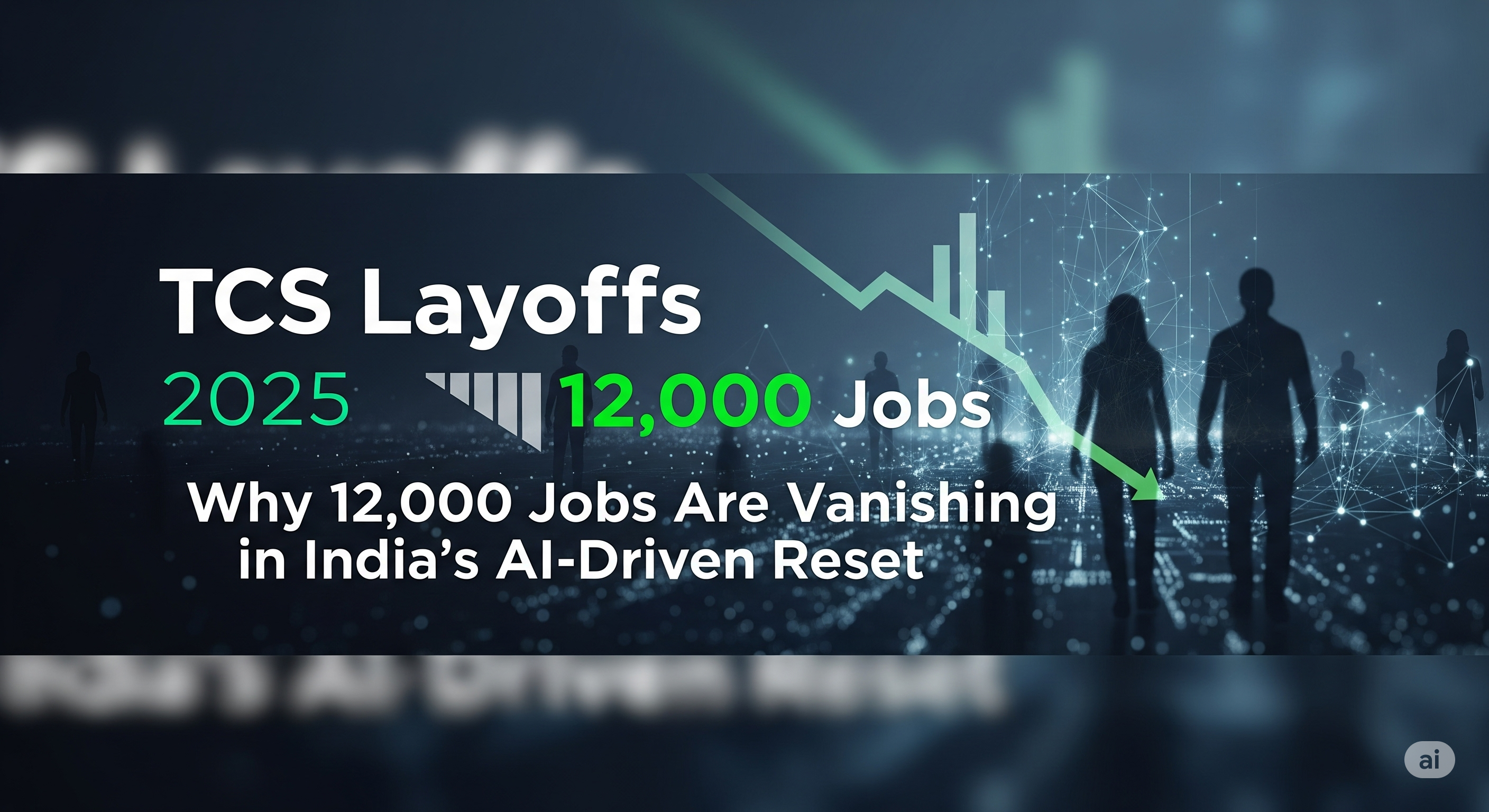
TCS Layoffs 2025: Why 12,000 Jobs Are Vanishing in India’s AI-Driven Reset
Introduction: The End of Job Security at TCS
In July 2025, Tata Consultancy Services (TCS) announced a major layoff—approximately 12,000 employees, representing around 2% of its global workforce. This move marks a historic shift in one of India’s largest IT services firms. Analysts say it reflects a larger structural transformation across India's tech landscape. (Reuters, Economic Times)
Drivers Behind the Cut: AI, Automation, and Skills Shift
TCS leadership attributes much of the decision to a mismatch between current roles and future needs. CEO K Krithivasan emphasised that many mid- and senior-level employees lacked skills aligned with AI-first delivery models. At the same time, automation is reshaping workflows across industries. (India Today)
While TCS states AI is not the direct cause, the macro context includes slower demand, the rise of generative AI (like ChatGPT), and mounting pressure for cost-efficient models. (Business Standard)
Who Is Impacted: Roles, Experience, and Deployment
The layoffs primarily affect mid-career professionals (9–17 years of experience) who are entrenched in legacy delivery models. Program managers, project leaders, and specialists in outdated technologies are most at risk. (Business Today, India Today)
Employees already 'on bench' (without active assignments) face new policy strictness. Bench time is capped at 35 days per annum—failure to redeploy within that window may lead to termination. (Business Today)
TCS’s workforce stood at approximately 613,069 as of June 2025, so this layoff represents a meaningful restructuring—especially in non-aligned skill sets. (Wikipedia)
Business Implications: Cost, Efficiency, and Margins
The layoffs are expected to save TCS between USD 300–400 million annually (INR 2,400–3,600 crore), improving net margins by roughly 100–150 basis points. After the announcement, share prices dropped about 2%, and investor sentiment has turned cautious. (Reuters, India Today)
Strategically, the shift enables TCS to deliver higher utilisation rates per employee, deeper automation in delivery centres, and leaner cost structures—moving away from high fixed-cost models. (Business Standard)
Support Offered: Severance, Reskilling, and Redeployment
TCS has committed to severance packages, outplacement services, internal redeployment options, reskilling programs, and emotional counselling. The transition is phased across fiscal year 2025–26 to give affected individuals time to adjust. (Business Today; Times of India)
Internal Policy Shifts: Hiring Freeze and Bench Control
TCS has paused salary hikes and halted senior-level lateral hiring globally. Onboarding delays have extended beyond 65 days in some cases. Freshers’ intake and lateral volume hiring have also slowed down. (India Today)
These measures further emphasise the company’s focus on productivity, utilisation, and tighter staffing models. (Times of India, Business Standard)
Sector-Wide Signal: Indian IT’s Structural Pivot
Analysts at Jefferies described the layoffs as a “canary in the coal mine” for the Indian IT sector—indicating urgency for other firms to recalibrate traditional delivery models. Firms like Infosys, Wipro, and HCLTech have already slowed hiring and demanded niche skills in AI and cloud domains. (Reuters, Business Standard)
Revenue-per-employee and automation KPIs are now critical metrics across the sector. Many companies are pushing for retraining and efficiency internally to avoid similar structural cuts. (Times of India, Business Standard)
Macro Context: Economic Pressures and AI Realities
Global economic headwinds, funding slowdowns, and inflationary pressure have dampened enterprise tech budgets. Meanwhile, AI-driven automation—whether in infrastructure monitoring, testing, or content generation—is freeing firms from human-heavy cost centers. (Times of India, Business Standard)
Advice for Professionals and Job Seekers
For mid-career and management-level professionals: • Reskilling is critical—focus on AI, cloud, ML Ops, data engineering, and prompt engineering. • Bench discipline is strict—bench time beyond 35 unused days may lead to exit. • Continuous learning and certification hours are increasingly tracked. • Roles centered on legacy coding frameworks are at highest risk. (India Today)
Regulatory and Union Developments
The Ministry of Electronics and IT (MeitY) is monitoring the process closely. Employee unions have lodged complaints, calling for transparency and alleging procedural issues. Karnataka’s IT minister, however, stated such corporate decisions fall under internal governance. (Business Standard, Economic Times)
What to Expect in 2025–26: Industry & Talent Shifts
As layoffs phase through FY26, expect ripple effects across Indian IT. Campus hiring is likely to prioritize AI-skilled talent, while volumetric intake drops sharply. Many firms may pivot sharply toward consulting- and automation-led delivery models. (Business Standard, Times of India)
Final Thoughts
The TCS layoffs are not a headline—they are a signpost of a broader transformation in the Indian IT ecosystem. While AI and automation have not caused indiscriminate displacement, they are reshaping roles, skills, and business models.
For professionals: upskill rapidly and stay adaptable. For businesses: rethink delivery and improve efficiency. For policymakers: support reskilling and ensure the transition is fair.

